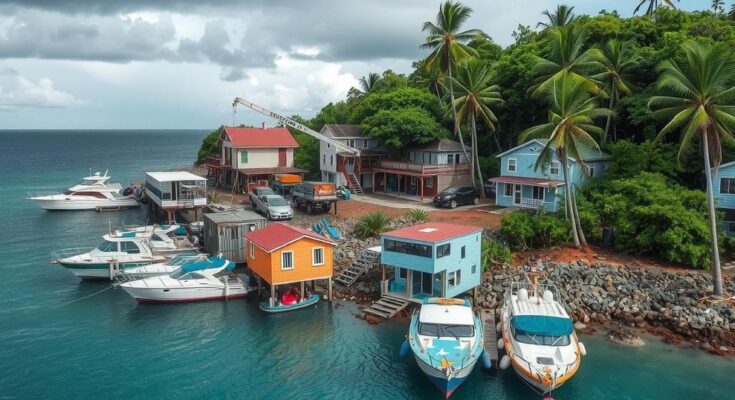Mayotte Island is facing grave challenges post-Cyclone Chido, the worst storm in nearly a century. Efforts to recover are hindered by overwhelming demand on hospitals and existing poverty in the region. A call for assistance has been issued as the affected population suffers from injuries and diseases, with expressions of sympathy from both religious leaders and international figures highlighting the urgency of relief efforts.
In the wake of Cyclone Chido, the most severe storm to hit Mayotte Island in almost a century, the French territory is facing immense challenges during its recovery efforts. Nearly a week post-cyclone, authorities are focusing on assessing casualties, restoring vital services, and providing assistance to the affected population. Local sources report widespread devastation throughout the region, already beset by poverty and inadequate resources.
Hospitals, already strained, are now overwhelmed with patients suffering from injuries, dehydration, malnutrition, and diseases linked to the disaster. Many neighborhoods have been entirely wiped out, with local residents disregarding warnings about the cyclone’s severity. Fears of deportation have kept migrants from seeking shelter, raising alarms that the casualty figures may be significantly higher than currently reported.
Mayotte, the poorest overseas department of France and the European Union, has long been plagued by systemic neglect and lack of investment. With approximately 75% of its 90,000 residents living in poverty, the island’s infrastructure was ill-equipped to handle a calamity of such magnitude. Cyclone Chido has intensified these pre-existing vulnerabilities, leading many to doubt the government’s capacity for prompt disaster response.
The predominantly Muslim population of Mayotte, which includes a significant Shia community, faces the dire consequences of this disaster. Acts of solidarity have emerged, but they are not sufficient to address the extensive damage incurred. In a gesture of compassion, Pope Francis has expressed his condolences during his public address, praying for the victims and the afflicted in Mayotte.
Grand Ayatollah Sayyed Sadiq al-Husseini al-Shirazi has also conveyed his sympathies, invoking divine mercy for the deceased and health for the injured, while urging the faithful to assist those impacted by this tragedy. The calls for help highlight the community’s resilience amidst despair and the collective effort needed to rebuild and recover from this calamity.
Mayotte Island, a part of France located in the Indian Ocean, has a predominantly Muslim population, with significant historical ties to Islam since the 15th century. This remote island, marked by severe economic challenges, registered high poverty rates and inadequate health services even before the cyclone struck. Cyclone Chido, a catastrophic weather event, has unleashed unprecedented destruction, exacerbating existing crises in the region and drawing attention to the failures in government support and infrastructure preparedness.
The aftermath of Cyclone Chido has left Mayotte Island grappling with significant humanitarian challenges, including health crises and widespread destruction. As relief efforts struggle to keep pace with the unfolding disaster, the local population, particularly the impoverished and marginalized groups, faces an uncertain future. Expressions of sympathy from global religious leaders signal an international acknowledgment of the tragedy. The commitment to provide aid remains crucial as the island seeks to rebuild and recover.
Original Source: shiawaves.com



